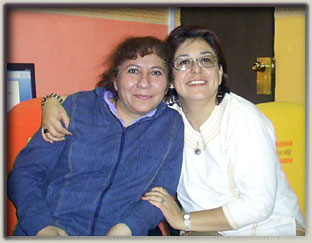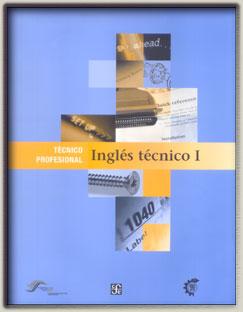
☙ Love ❧
Sequelæ
Inglés Técnico
While the following account might seem at first to have been initially inconsequential, little more than what was the lead‑up to a portion of my work eventually being reproduced in a Spanish textbook for teaching students English grammar, there actually came to be an extremely touching (if not heart-breaking) story underlying how it all ultimately transpired, with the end result giving that portion of this A Letter To My Imaginary Friend a completely new meaning and purpose, well beyond — if not completely separate and distinct from — the personal love letter within which it was originally included.
This story began on August 13th, 2003, when I was contacted through here at my Psymon web site by Rosa Irene Peña Angón and her colleague, Moisés Heriberto Córtes Cruz, who introduced themselves as educators in Cuernavaca, Mexico, with a request concerning a section of this site entitled The Legend of Koster (as it was at that time more succinctly titled)
They wrote (in part):
We are High School teachers developing Reading Comprehension text books. In this creative work, we would like to include part of the text the legend of Koster in your website which will help our students to understand the importance of these elements in the analysis of the text.
This work is only for didactic purposes. We would greatly appreciate you sending us the authorization to use them in the entitled texts books “Inglés Técnico I” and “Inglés Técnico II”.
I wrote them back the following day to let them know that I would be happy to approve their request (as long as they gave the appropriate copyright notice/credit for my work, of course), and asked whether I might also receive a copy of their book once it was published.
It was over a year later before I heard back from them again, when, on November 8th, 2004, I received an update that the book was still being prepared and had not yet been published, and further that they had changed their minds about using The Legend of Koster and in its place hoped to use excerpts from my A Letter to an Imaginary Friend (as it was then titled) instead. Their message included a rough draft of how they intended it to appear, and they also told me that they hoped that the book would be published by the summer of the following year (2005).
Once again I wrote them back to offer them my approval, this time also expressing my elation that they had chosen to use the text from my Letter site instead (which is only naturally very near and dear to my heart) for the purpose of teaching English to high school students.
The next year, on September 9th, 2005, I received the good news from Rosa that the book had finally been published, and that a copy would be sent to me...
...and naturally I responded with my delight that they had successfully completed their long project, and expressed my happy anticipation in receiving the forthcoming copy of their textbook.
Sure enough, some time later I received my “snail-mail” package from Mexico with a copy of Rosa’s book, Inglés técnico I — never in my wildest imagination, though, could I have expected the incredibly touching letter which would accompany it! This was truly such a deeply moving letter for me to receive, not just for the kind words about that text of mine which they’d used and their appreciation for my having given them permission to use it, but far more for the very tragic, very sorrowful — and yet so very, very full-of-love — story that had taken place during the preparation of the book.
The text of my Letter invokes within me almost countless thoughts, feelings and memories about many people (not the least of which being the woman to whom the original letters were written, of course), but there simply are no words for me to describe what I felt upon reading Rosa’s personal letter to me. It is just so much easier for me to allow, forthwith, her words to speak for themselves...
Cuernavaca, Morelos on September 15, 2005
Dear Ron Koster:
I want you to know that throughout the development of the book, the most important part was to know and to have lived with the people who were with me.
The facts were:
The authorities put us together in a hotel, almost locked us in, to take one week courses that allowed us to make the work material coherent. During those three years, there were approximately 6 courses in which I met, lived with companions or fellow workers that now are close friends.
There were difficult moments, for example one in which the book sat for six months on the writing-desk of the “guy” that had to give the authorization for its publication, and like a good bureaucrat, this “guy” never bothered to go to his office during that time. It was a moment in which I began to feel and to think that the important thing was not the publication of the book but to share our lives, to coexist in the moment which I was living. I was no longer concerned with the publication and I concentrated on being useful to my friends in these courses.
The group in charge of all this process “in the Mexican bureaucracy” is called Fomento Editorial. One of its members is a beautiful person, Ana Gema Rivera, who supported us at all times. Ana Gema was an unmarried mother of a little 7 year old girl who was called Ana Belem. In one of the courses, the little girl came to eat with us, a Tuesday, in the hotel where we took the course; and on Wednesday, Ana Gema no longer came. We didn’t see her for two months when she told us that Ana Belem had been diagnosed with leukemia. As you will understand, we were crying and we talked for a long time. They were going to come to Cuernavaca because they had been told about some treatment that they gave here but there wasn’t time. Four months later, the 24th of February of this year, Ana Belem passed away in her house and in the arms of Gema. I don’t know if you have children, what I know is that men cannot know the pain that causes the emptiness of the irreparable loss of a child. Because in the end, what is natural, what is desirable in life is that it be the children that bury their parents. How many things died with her, how many opportunities, how many smiles, how many sadnesses. How much of that life that was not obtained.
It was in February of this year that the publishing house retook the work and your text A Letter to an Imaginary Friend carried me invariably to that person so loved by Ana Gema, who was no longer, Ana Belem. So your text had for her and for me another meaning.
Moy, who is a linguist says that your writing had achieved a different meaning. It was close to us all and I’m sorry, but although you may not like it, Ana Belem is in your words.
Ana Gema has been very brave, she keeps it together for her closest friends and the project to promote books and to support those for whom we are doing it.
During the presentation of my book I wrote by hand on page 94 of my book where your text is, that it was for her and for Belem, because it is a pain that is transformed into nostalgia and intimacy, that can only have the gentleness and the beauty, that your text expresses, to mitigate this pain that for her is unending.
Thanks Ron, for all your support and for the text that has served to unite us and to mitigate an emptiness that eats away at the heart, thanks, very many thanks.
Rosi Peña
- Read: Rosa Peña to Ron Koster (2005-09-15) in the original Spanish, with many thanks to Elizabeth Challis for the above Spanish-English translation
Rosa’s letter left me not just speechless, but tearfully so. I confess that I was somewhat confused at first, though, if only because my Letter site, taken as a whole, is filled with a far more romantic, more passionate, more “adult” expression of thoughts and feelings — certainly not something that would in any way be appropriately written to a young child. Upon further reflection, however, I realized that it was specifically the Prologue which, when taken on its own, expressed sentiments that could indeed be taken in this entirely different — but just as deeply (if not more deeply) loving and sentimental — light.

Rosa Irene Peña Angón (left)
and Ana Gema Moreno Rivera (right)
I am truly honoured that my writing has been able to help — in however a small, nominal way that it might be — with the sharing and learning of language for young people in a country far away, but with the most heartfelt gratitude more personally to both Rosa and her friend Ana Gema in return, I could also only say...
May your loving words imparted,
embraced in kind by words of love presented,
be forever dedicated in Heaven,
to the Eternal Spirit of Ana Belem.
Ron Koster, Ottawa
September 9, 2008
(Revised for clarity 2021–03–01)
✾
PDF Download
In the PDF file below (click image to view/download) you will find scans of the following pages from Rosa Peña’s book, Inglés Técnico I:
- Cover;
- Title page;
- Copyright notice (cataloguing-in-publication);
- Excerpt from the table of contents (showing the context for pages 93–96); and
- Pages 93–96, i.e. the section which includes text from A Letter to an Imaginary Friend (note that the version used for Rosa Peña’s book was a very early one!), along with the accompanying exercises.

Excerpts from Inglés Técnico I
My most genuine and sincere gratitude to
Rosa Peña and Ana Gema for their permission
to recount the story presented here.
Questions? Comments? Bug report?
☞ Contact Psymon ☜
All text, graphics and web design of this entire site
are copyright © Ron Koster / Psymon
and may not be reproduced or distributed in any manner
without explicit permission of Ron Koster / Psymon.
All Rights Reserved.
